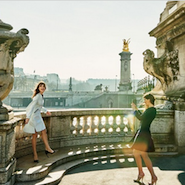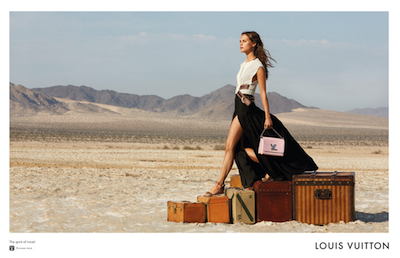 Luxury consumers are increasingly favoring experiences; image courtesy of Travel + Leisure
Luxury consumers are increasingly favoring experiences; image courtesy of Travel + Leisure
NEW YORK – Now in the “turbulent teens” of the 21st century, luxury consumers are changing their mindset, forcing brands to evolve along with them, according to an executive from The Future Laboratory at the U.S. Retail & Luxury Futures Forum on Oct. 21.
Presenting the results of a survey of United Kingdom and United States consumers it conducted this summer, The Future Laboratory found that “luxurians” in these countries are generally seeking out experiences over goods, craving a meaningful human connection from the brands they interact with. Brands need to respond with interactions that play to consumers' intangible desires that exist outside of material ownership.
"Change is afoot," said Tom Savigar, chief strategy officer at The Future Laboratory. "We’re halfway through the turbulent teens, and our luxurian consumer is saying, ‘I love that, therefore I expect you to change, brands. I expect you to be experimenting, to be daring, to be different.
"That sense of happy and optimism not because of the size of their wallets or their purses, but actually a sense of meaningfulness in life," he said. "That sense of gratification and that sense of reward that they get from lifestyle now is increasingly important as they’ve been buffered and changed according to the global financial crisis."
Consumer tribes
Across all generations and income levels, there are five stages of luxury consumption.
No consumer is permanently fixed in one state, enabling them to develop and mature over time. Likewise, brands can target consumers at multiple stages.
 Louis Vuitton cruise 2016 campaign
The five stages range from the superficial to the immersive.
1. “Acquisition and Value” represents 14 percent of the luxury market. These consumers buy for the sake of flash and status, seeking a level of celebration and opulence, making a brand relationship virtually unnecessary. This aspirational aesthetic most commonly seen in emerging markets, but it is also prevalent among American males. Louis Vuitton is rare in its ability to appeal to consumers in this stage as well as more sophisticated mindsets.
2. In “Discernment and Wealth,” consumers begin to ask more about the provenance of the product they are thinking of buying or the heritage of the brand. This stage was the largest among American consumers until five years ago, and now represents 17 percent of the market. This is the stage in which making a human connection becomes worthwhile; however, consumers are still seeking an aspect of flash in the touches, such as packaging.
3. “Emotion and Experience” is where the most luxury consumers are currently situated, with 41 percent favoring expenditures that come with a sense of story over material goods, such as vacations. These individuals do still spend on products, but the in-store environment needs to build an experience for them that goes beyond the material. Mr. Savigar said that the term “experiential” should be banned, since it does not do enough to differentiate, so brands need to find better adjectives to define their bricks-and-mortar presence.
4. The 15 percent of luxury consumers currently in the “Responsible and Aware” stage are most concerned about the impact of the goods they are buying. They seek out brands that care about doing good, particularly in topics surrounding the environment, and brands invite their loyal fans to become an active part of their efforts. Millennials make up 41 percent of this subset, making it an important target audience for the future.
5. “Intellectual and Poetic” is also millennial-heavy, with 42 percent of those in the category within the emerging generation. The 15 percent of consumers in this group have transcended product or brand and are instead focused on enjoyment itself, whether it means challenging themselves in nature or going on a spiritual journey. The number of U.S. and UK consumers who fall in this category is growing.
Louis Vuitton cruise 2016 campaign
The five stages range from the superficial to the immersive.
1. “Acquisition and Value” represents 14 percent of the luxury market. These consumers buy for the sake of flash and status, seeking a level of celebration and opulence, making a brand relationship virtually unnecessary. This aspirational aesthetic most commonly seen in emerging markets, but it is also prevalent among American males. Louis Vuitton is rare in its ability to appeal to consumers in this stage as well as more sophisticated mindsets.
2. In “Discernment and Wealth,” consumers begin to ask more about the provenance of the product they are thinking of buying or the heritage of the brand. This stage was the largest among American consumers until five years ago, and now represents 17 percent of the market. This is the stage in which making a human connection becomes worthwhile; however, consumers are still seeking an aspect of flash in the touches, such as packaging.
3. “Emotion and Experience” is where the most luxury consumers are currently situated, with 41 percent favoring expenditures that come with a sense of story over material goods, such as vacations. These individuals do still spend on products, but the in-store environment needs to build an experience for them that goes beyond the material. Mr. Savigar said that the term “experiential” should be banned, since it does not do enough to differentiate, so brands need to find better adjectives to define their bricks-and-mortar presence.
4. The 15 percent of luxury consumers currently in the “Responsible and Aware” stage are most concerned about the impact of the goods they are buying. They seek out brands that care about doing good, particularly in topics surrounding the environment, and brands invite their loyal fans to become an active part of their efforts. Millennials make up 41 percent of this subset, making it an important target audience for the future.
5. “Intellectual and Poetic” is also millennial-heavy, with 42 percent of those in the category within the emerging generation. The 15 percent of consumers in this group have transcended product or brand and are instead focused on enjoyment itself, whether it means challenging themselves in nature or going on a spiritual journey. The number of U.S. and UK consumers who fall in this category is growing.
 Fortnum & Mason spa
Brands can put these findings into practice by hiring personnel devoted to making a connection with consumers, such as an executive vice president of senses. Brands should also think about how their identity can be communicated via all senses, even those typically unexplored, such as scent.
Retail as theater
The luxury retail environment is undergoing critical changes, making it is essential for retailers to focus their attention on enhancing the in-store experience, according to a recent report by Unity Marketing.
Fortnum & Mason spa
Brands can put these findings into practice by hiring personnel devoted to making a connection with consumers, such as an executive vice president of senses. Brands should also think about how their identity can be communicated via all senses, even those typically unexplored, such as scent.
Retail as theater
The luxury retail environment is undergoing critical changes, making it is essential for retailers to focus their attention on enhancing the in-store experience, according to a recent report by Unity Marketing.
Affluent consumers increasingly prefer to shop online, and for traditional retailers to compete they will need to offer more specialized and personalized retail experiences. Furthermore, as affluents have been shown to have less interest in the accumulation of possessions, it is important for retailers to make stores more experiential and craft a rewarding experience for consumers (see story).
With baby boomers aging out of luxury consumption and millennials only now entering the market, brands need to find creative ways to engage both generations, according to a panel at the Luxury Retail Summit: Holiday Focus 2015 Sept. 16. The concept of “luxury” is alive and well, particularly among boomers who continue to associate it with value, quality and customer service, but with millennials looking for more experiential offerings and showcases of values, events and indications of culture are also becoming increasingly important. Still, despite apparently separate values and interests, it is important to remember that millennials are often the children of baby boomers, meaning that these generations are closer than they initially appear and that there are ways, such as family-oriented events, to appeal to both markets simultaneously rather than treating them as entirely separate entities (see story). "While celebrating your values and your history, push innovation to continue to create the new and the unexpected," Mr. Savigar said. "We love the unexpected. "Build relationships in which you treat your customers as members," he said. " You’ve now got people being born who are going to live until 140. That’s 120 years…of relationship management. Are you ready for that?" Final Take Sarah Jones, staff reporter on Luxury Daily, New York